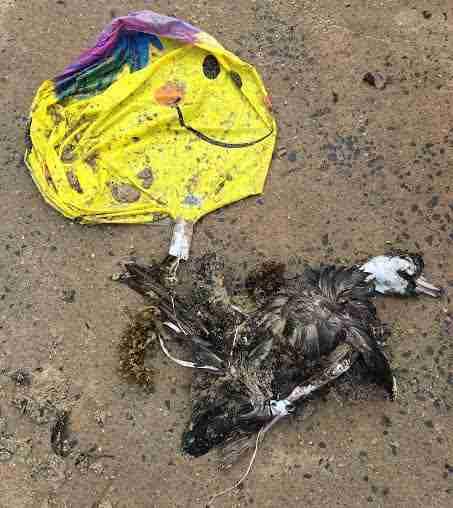NATIONAL NEWS - In an interview aired on ENCA news channel on Monday, 28 January, the Cape Town Two Oceans aquarium complex communications executive Renee Leeuwner warned that balloons posed an appalling threat, alongside other plastics, to marine and terrestrial life.
Leeuwner said that most people do not realise, not only is it illegal to release balloons into the air (they fall under "mass littering events" offences) but they are so light that they travel far out to sea.
She also mentioned that balloons are single use plastic and therefore one of the worst and most pollutant plastics.
The balloons get mistaken for food by marine animals such as turtles and the aquarium has had to rehabilitate and later release numerous sea creatures which have had plastic lodged in their digestive systems.
Plastic, according to Leewner, "breaks up" as opposed to breaks down like natural materials which release their elements back to nature. The balloons and other plastics gradually form of smaller and smaller particles that are found to be present in millions of fish, sea mammals and more.
Many brands of fishmeal, which is fed to chickens and which are then eaten by humans, contain these minute plastic pieces.
According to the Plastic Pollution Coalition website: "Even plankton, the tiniest creatures in our oceans, are eating micro-plastics and absorbing their toxins.
"The substance displaces nutritive algae that creatures further up the food chain require. Plastic attracts other pollutants. Manufacturers' additives in plastics, like flame retardants, BPAs and PVCs, can leach their own toxins.
"These oily poisons repel water and stick to petroleum-based objects like plastic debris. Entanglement, ingestion and habitat disruption all result from plastic ending up in the spaces where animals live. In our oceans alone, plastic debris outweighs zooplankton by a ratio of 36 to one."
The coalition urges the public: Take the 4 Rs pledge:
- Refuse disposable plastic whenever and wherever possible. Choose items that are not packaged in plastic and carry your own bags, containers and utensils. Say 'no straw', please.
- Reuse durable, non-toxic straws, utensils, to-go containers, bottles, bags, and other everyday items. Choose glass, paper, stainless steel, wood, ceramic and bamboo over plastic.
- Reduce your plastic footprint. Cut down on your consumption of goods that contain excessive plastic packaging and parts. If it will leave behind plastic trash, don't buy it.
- Recycle what you can't refuse, reduce or reuse. Pay attention to the entire life cycle of items you bring into your life, from source to manufacturing to distribution to disposal.
Leewner advised people to not buy or use balloons and rather decorate party tables and celebrate special events with natural, personalised adornments.
 Balloons are single use plastic and therefore one of the worst and most pollutant plastics.
Balloons are single use plastic and therefore one of the worst and most pollutant plastics.
 Balloons can cause injury or death.
Balloons can cause injury or death.
'We bring you the latest Garden Route, Hessequa, Karoo news'
















